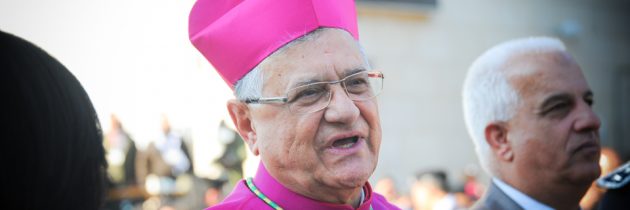INTERVIEW – After Pope Francis accepted his resignation June 24, 2016, Patriarch Fouad Twal, who, last October, reached the age limit of 75 years, is about to retire, looks back on his years of mission as shepherd of the Church of the Holy Land, and the legacy that he now leaves in the hands of the new Apostolic Administrator, Father Pierbattista Pizzaballa.
You have arrived at the end of your mission, as you look back how would you assess your mandate?
I’ve reached the end of my mission as Patriarch, however my mission as a priest, friend and citizen continues… When I look back on my past life, I see it as a feature-length film. So many things have happened, come and gone, intertwined, some happy and encouraging, others more difficult and complicated: A great journey that started here in Jerusalem, yet to finish here in Jerusalem. I also see in the film of my life, several weak points, but I think more and more I see the presence of God’s hand, a hand saving us, sustaining us, and another hand indicating the right path to continue along the already started road … I have often felt alone before a decision, alone making a decision despite the presence of a crowd of people around me… sometimes we find that we have fewer friends than previously thought, where moving from the main actor role to that of a spectator who looks at events without being able to create or make history. Perhaps that will be my role, now that I retire.
What words would you, or have you addressed to Fr. Pizzaballa appointed Apostolic Administrator of the Diocese of Jerusalem? What will you see as the biggest challenges of his mandate?
Among the assets that the new Administrator can count is the fact that he served for 12 years as Custos of the Holy Land and was the Vicar of the Latin Patriarch for the Hebrew speaking Catholic community: He knows very well the challenges and problems of the Church in the Holy Land, which I have often referred to as the Church of Calvary.
To these assets, nevertheless, are the added problems of the Arabic language, the Eastern mentality and all pastoral activity. So I understand his concern, that of our priests and even some Franciscans… We are all full of good will to help in this task… It will be definitely be easier to remedy the weaknesses of the administration than to manage the pastoral care of the Arab faithful. But it is also true that foreign faithful of the Latin Patriarchate now outnumber the local Arab Christians.
The strength of the new Administrator would be to totally win the confidence of the priests, begin the reform with conviction and without hesitation, while remembering that the administrator’s job does not always mean popularity. He will also have to ensure keeping this delicate balance of relations with the Israeli, Palestinian and Jordanian authorities.
How can we face the future with hope despite the situation in the Holy Land and the region? What message would you leave?
Before looking at the future, I look at the present and it fills me with sadness! The world’s attention has been focused on the war and massacres in Syria and Iraq, more than on the Holy Land. And lately, when violence hit Europe, the West began to think of Christians in the Middle East, of our refugees, and to open some embassy doors to grant visas. But all those who were killed, massacred, or who only had a ‘visa’ to return to the Eternal Father, nobody talks about! To the new Administrator, I would say that he must continually have the courage to speak, to tell the truth, nothing more or less… There are many who prefer our silence, because our speech is bothersome… It is necessary to speak with caution and respect, but speak, raise awareness and nurture these relationships we have built internationally throughout this course. Not forgetting of course our most important relationships: our relationship with the Lord, our brothers, and our religious communities, these are our greatest assets…
You will be able to begin to relax now, what are your plans for this new stage?
Until the arrival of the new director, I continue to solve difficult issues, and today I definitely do need rest, but I also need to take a different pace of work and relationships. I put myself at the disposal of our bishops and our priests to help them as much as possible in their pastoral work … I want to still be with the families and the faithful. I certainly will do less travel abroad where I used to participate in numerous conferences… In a word, it will now be a lifestyle that is more consistent with my age… I am also preparing a book retracing almost all of my life (if possible!) and I want to leave it as a final message. I will be happy and also freer to receive friends.
Interview by Myriam Ambroselli
Source: Latin Patriarchate of Jerusalem






